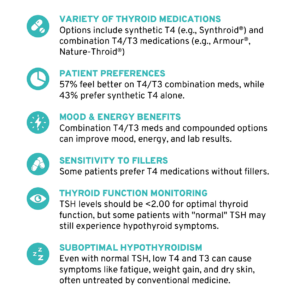Most women who choose Advanced Practice Clinic do so because they are searching for non-conventional approaches to their health. They are looking for a provider who will actually listen to them and address their symptoms, not just look at the lab values. Conventional medicine has left women with few answers to their symptoms of hormone health, weight control, thyroid, and sexual health.
Hormone imbalances can lead to a variety of disruptive symptoms, including fatigue, weight gain, mood swings, and decreased libido. Hormonal imbalance symptoms often go untreated when lab values fall within the “normal” range, despite the patient expressing their discomfort. This gap in care is where Bioidentical Hormone Replacement Therapy (HRT) can make a significant difference. HRT is designed to restore hormone levels to a state that alleviates symptoms, helping patients regain their energy, mood stability, and overall sense of well-being.
Similarly, thyroid imbalances can be particularly challenging. The thyroid is responsible for regulating metabolism, energy levels, and even mood. When thyroid function is suboptimal, patients may experience symptoms such as unexplained weight gain, chronic fatigue, depression, and hair loss, despite having “normal” lab results. This is why many seek thyroid optimization—to go beyond the conventional approach and achieve a level of thyroid function that truly supports their health and lifestyle.
The problem we see so many times in our office is that conventional medicine has stopped treating the ROOT cause of the patient’s symptoms and only concerns themselves with ensuring the patient’s labs are within the average range. There is a huge difference between being in the average range with 95% of the population and being optimal in your health and symptom control. At Advanced Practice Clinic, we aim to get to the root issue causing your symptoms.
Bioidentical Hormone Replacement
Bioidentical Hormone Replacement Therapy (BHRT) Researchers from Case Western Reserve University and McGill University interviewed 25 women using bioidentical hormone replacement therapy (BHRT). Women told researchers they used BHRT to relieve their menopausal symptoms, feel energized, and avoid chronic illnesses associated with aging.
Women may feel better on bioidentical hormone therapy, with a reduction of hot flashes, sweats, sleep disturbance, lethargy, vaginal dryness, and an increase in mood. Improved sexual function, energy levels, overall quality of life, and well-being have all also been well described in studies of BHRT use.
In terms of long-term benefits, a reduction in the risk of cardiovascular disease, osteoporosis, and possibly brain function decline have all been associated with BHRT use.
All your hormones balance on a teeter-totter, when one goes up the others go down. So it is best to balance all your hormones together for optimal symptom control. This includes your sex hormones, your adrenal or stress hormones, and your thyroid hormones.

Thyroid Optimization
There are quite a few options for thyroid medications for hypothyroidism. However, most people are only familiar with synthetic T4-containing thyroid medications such as Levothyroxine® or Synthroid®.
Some people report feeling better on combination T4/T3 medications like Armour® or Nature-Throid®. Others may feel better taking synthetic T4 medications alone like Synthroid®, Tirosint® or Levoxyl®. And some patients may benefit from a synthetic T3 medication alone like Cytomel®.
Still, many women feel best when on T4-containing medications made without fillers that they are sensitive to.
Of the patients I’ve surveyed, 57% felt better taking a combination T4/T3 medication, while 43% felt better on a synthetic T4 medication.
Lab results seem to be most improved with Synthroid® (69%), mood and overall energy seem to improve more by switching to a combination medication like Nature-Throid® (63%) or better yet utilizing a compounded T3/T4 option in a sustained-release capsule.
Changing your thyroid medication may help you absorb thyroid hormone better, which may, in turn, result in a reduction in symptoms and an increase in mood and energy levels!
The brain monitors your thyroid function and secretes a hormone called the Thyroid Stimulating Hormone or TSH. Generally, if your thyroid is functioning well, the TSH level is within an optimal range <2.00 (range is 0.5-4.5). However, if it is not working well the TSH may be too low or too high.
Suboptimal central hypothyroidism is a condition where the TSH is actually within the average range but the T4 and T3 levels remain below normal and the patient is symptomatic with fatigue, weight gain, thinning hair and nails, dry skin, constipation, and many other issues.
Conventional medicine rarely will treat a patients thyroid if the TSH is within the average range 0.5-4.5.

Nutrition is Key
Nutrition is essential for all your hormones and thyroid to function appropriately. The thyroid gland utilizes certain nutrients such as iodine, selenium and magnesium to make T4. Then the gut and liver converts T4 into an active thyroid hormone T3 using vitamins and minerals such as magnesium, selenium and vitamins A, B, C and others.
Regardless of the actual lab results, if the nutrient status is poor, the patient may still experience thyroid-related symptoms.
Ready to take by your health?
Schedule a consultation with us today. We look forward to meeting you!
SCHEDULE CONSULTATION




